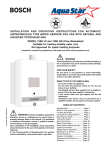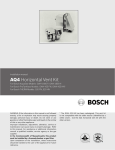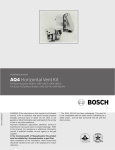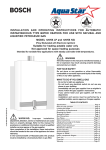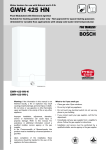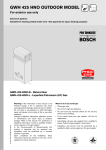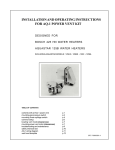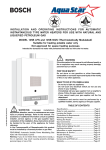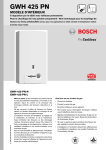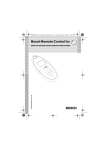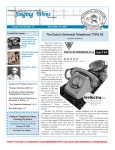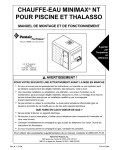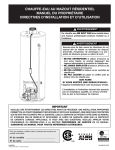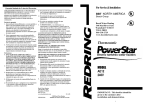Download Bosch Appliances GWH 1600 H Ventilation Hood User Manual
Transcript
Installation manual AQ4 Horizontal Vent Kit For Bosch AquaStar Models: GWH 1600 P, GWH 1600 H For Bosch Pro Tankless Models: GWH 425 PN, GWH 425 HN* WARNING : If the information in this manual is not followed exactly, a fire or explosion may result causing property damage, personal injury or death. Do not store or use gasoline or other flammable vapor and liquids in the vicinity of this or any other appliance. Improper installation, adjus tment, alteration, ser vice or maintenance can cause injury or property damage. Refer to this manual. For assistance or additional information consult a qualified installer, ser vice agency or the gas supplier. In the Commonwealth or Massachusetts this product mus t be installed by a licensed plumber or gas fit ter. Upon completion of the installation, these instructions should be handed to the user of the appliance for future reference. * The GWH 425 HN has been redesigned. This vent kit is not compatible with the older version (identified by a white cover). Use the AQ1 horizontal vent kit with the older version. Table of Contents Table of Contents 1 Introduction ........................................................................ 3 1.1 1.2 1.3 1.4 ............................................................................... 3 ............................................................................... 3 ............................................................................... 3 Parts included Warnings Preparation Requirements for installation in Massachusetts ............................................................................... 4 2 AQ4 Installation instructions ........................................................................ 5 2.1 Introduction 2.2 Locating power vent hood and clearances 2.3 Power vent hood 2.4 Power vent motor 2.5 Vent piping 2.6 Linear safety spillage switch 2.7 Flow switch ............................................................................... 5 ............................................................................... 5 ............................................................................... 5 ............................................................................... 6 ............................................................................... 7 ............................................................................... 7 ............................................................................... 8 3 Operation ........................................................................ 9 3.1 First time start up ............................................................................... 9 4 Maintenance ........................................................................ 9 5 Troubleshooting ...................................................................... 10 5.1 Introduction 5.2 Power vent motor runs all the time or intermittenly without water flow 5.3 Pilot will not hold when lit or spark automatically with hot water flow 5.4 Pilot goes out during hot water use 5.5 Noise when power vent motor is running ............................................................................. 10 ............................................................................. 10 ............................................................................. 10 ............................................................................. 10 ............................................................................. 10 6 One Year Limited Warranty ...................................................................... 11 7 Wiring diagram ...................................................................... 12 8 Vent hood template ...................................................................... 13 2 AQ4 Manual Introduction 1 Introduction 1.1 Parts included Vent Hood Kit • 1 - 4" vent hood: VH1-4 • 4 - Exterior screws • 1 - 5" to 4" vent reducer pipe • 1 - AQ4FLAPPER back draft accessory Vibration Mount Packet • 2 - Vibration mounts with nuts and washers • 2 - Brackets with nuts and washers Flow Switch Packet • 1 - Flow switch • 3 - Replacement pipes (See chapter 2.7) • 2 - Pipe clips • 1 - Molex connector cable • 1 - Heat exchanger bushing Power vent motor • 1 - Power vent motor (HSUL-1 Series containing integrated 24v control circuit) including 25 foot control cable with wire nuts and an HPN 6-foot power cord • 5 - Nylon ties War ning: Failure to install AQ4FLAPPER arning: properly may allow freezing air to come in contact with the water heater’s heat exchanger and cause the heat exchanger to burst. Such damage is not covered under the water heater’s warranty. 1.3 Preparation 1. Follow installation and operating instructions manual supplied with the water heater. 2. Before mounting water heater to wall, check its minimum clearance requirements. 3. When using an AQ4 the maximum vent length from the water heater to the point of termination is 25 feet. Subtract 5 feet for each additional 90° elbow (up to two additional elbows allowed.) 4. Install power vent motor as close to the vent hood as possible. 1.2 Warnings 1. Failure to install, maintain and/or operate the power vent in accordance with manufacturer’s instructions may result in conditions which can produce bodily injury and property damage. 2. The power vent must be installed by a qualified installer in accordance with all local codes or, in their absence, in accordance with the National Fuel Gas Code (ANSI Z223.1 NFPA #54), the National Electric Code, the Canadian Electrical Code (C22.1), Canadian Gas Code (CSA B149.1) and The Occupational Health and Safety Act (OSHA) as applicable. 3. The power vent motor shaft must be mounted horizontally to prevent motor bearing wear. 4. Disconnect power supply when making wiring connections or when working around the fan blade and motor. Failure to do so may result in severe personal injur y and equipment damage. 5. Make certain the power source is adequate for the fan motor requirements. Do not add the power vent to a circuit where the total load is unknown. AQ4 Motor is 200 watts- 1.66 amps @ 120vac. 6. Locate the outlet receptacle as close to the vent motor as possible. Do not use an extension cord. AQ4 Manual 3 Introduction 1.4 Requirements for installation in Massachusetts Attention residents of the Commonwealth of Massachusetts: In the Commonwealth of Massachuset t s the following regulation went into effect on 12/30/2005: (a) For all side wall horizontally vented gas fueled equipment installed in every dwelling, building or structure used in whole or in part for residential purposes, including those owned or operated by the Commonwealth and where the side wall exhaust vent termination is less than seven (7) feet above finished grade in the area of the venting, including but not limited to decks and porches, the following requirements shall be satisfied: 1. INSTALLATION OF CARBON MONOXIDE DETECTORS. At the time of installation of the side wall horizontal vented gas fueled equipment, the installing plumber or gasfitter shall observe that a hard wired carbon monoxide detector with an alarm and battery back-up is installed on the floor level where the gas equipment is to be installed. In addition, the installing plumber or gasfitter shall observe that a bat tery operated or hard wired carbon monoxide detector with an alarm is installed on each additional level of the dwelling, building or str ucture served by the side wall horizontal vented gas fueled equipment. It shall be the responsibility of the property owner to secure the services of qualified licensed professionals for the installation of hard wired carbon monoxide detectors. a. In the event that the side wall horizontally vented gas fueled equipment is installed in a crawl space or an attic, the hard wired carbon monoxide detector with alarm and battery back-up may be installed on the next adjacent floor level. b. In the event that the requirements of this subdivision can not be met at the time of completion of installation, the owner shall have a period of thirty (30) days to comply with the above requirements; provided, however, that during said thirty (30) day period, a battery operated carbon monoxide detector with an alarm shall be installed. 2. APPROVED CARBON MONOXIDE DETECTORS. Each carbon monoxide detector as required in accordance with the above provisions shall comply with NFPA 720 and be ANSI/UL 2034 listed and IAS certified. 3. SIGNAGE. A metal or plastic identification plate shall be permanently mounted to the exterior of the building at a minimum height of eight (8) feet above grade directly in line with the exhaust vent 4 terminal for the horizontally vented gas fueled heating appliance or equipment. The sign shall read, in print size no less than one-half (1/2) inch in size, “GAS VENT DIRECTLY BELOW. KEEP CLEAR OF ALL OBSTRUCTIONS”. 4. INSPECTION. The state or local gas inspector of the side wall horizontally vented gas fueled equipment shall not approve the installation unless, upon inspection, the inspector obser ves carbon monoxide detectors and signage installed in accordance with the provisions of 248 CMR 5.08(2)(a)1 through 4. (b) EXEMPTIONS: The following equipment is exempt from 248 CMR 5.08(2)(a)1 through 4: 1. The equipment listed in Chapter 10 entitled “Equipment Not Required To Be Vented” in the most current edition of NFPA 54 as adopted by the Board; and 2. Product approved side wall horizontally vented gas fueled equipment installed in a room or structure separate from the dwelling, building or structure used in whole or in part for residential purposes. (c) MANUFACTURERS REQUIREMENTS – GAS EQUIPMENT VENTING SYSTEM REQUIRED. When the manufacturer of Product Approved side wall horizontally mounted gas equipment provides a venting system design or venting system components with the equipment, the instructions provided by the manufacturer for the installation of the equipment and the venting shall include: 1. Detailed instructions for the installation of the venting system or the venting system components: and 2. A complete parts list for the venting system design or venting system. (d)MANUFACTURER REQUIREMENTS – GAS EQUIPMENT VENTING SYSTEM NOT PROVIDED. When the manufacturer of a product approved side wall horizontally vented gas fueled equipment does not provide the parts for the venting of flue gases, but identifies “special venting systems,” the following requirements shall be satisfied by the manufacturer: 1. The referenced “special venting system” instructions shall be included with the appliance or equipment installation instructions; and 2. The “special venting systems” shall be product approved by the Board, and the instructions for that system shall include a parts list and detailed installation instructions. (e) A copy of all installation instructions for all products approved side wall horizontally vented gas fueled equipment, all venting instructions, all parts lists for venting instructions, and/or all venting design instructions shall remain with the appliance or equipment at the completion of the installation. AQ4 Manual AQ4 Installation instructions 2 AQ4 Installation instructions Also: 2.1 Introduction Please follow these instructions. Failure to follow instructions may result in: · Damage, injury or death · Improper operation · Loss of warranty If you are unable to perform the tasks required to install the water heater and this accessory properly, please contact a locally licensed plumber, HVAC contractor or gas technician. Please contact Bosch Water Heating with any questions. 2.2 Locating power vent hood and clearances The maximum vent length from the water heater to the point of termination is 25 feet. If using more than one 90° elbow, subtract 5 feet off the maximum vent length for each additional elbow used. Maximum of three elbows allowed. The power vent motor must be installed as close as possible to the VH1-4 vent hood. Clearances The vent system must terminate so that proper clearances from the center of the vent hood (Fig. 1) are maintained as cited in the National Fuel Gas Code, ANSI Z223.1 and CSA B149.1 in Canada: “The exit terminals of mechanical vent system shall be located not less than 7 feet above grade when located adjacent to a public walkway. The venting system shall terminate at least 3 feet above any forced air inlet within 10 feet. The venting system shall terminate at least 4 feet below, 4 feet horizontally from or 1 foot above any door, window or gravity air inlet into any building.” 2.3 Power vent hood 1. Attach the mounting template (on page 13) to the interior wall that the vent hood will be penetrating. 2. Insure the proposed vent termination clearances are met (Chapter 2.2) before cutting opening through wall. Using a 1/2" drill bit, drill two pilot holes where noted on the template. The drill bit must be long enough to penetrate to the building exterior. 3. Attach the template to the outside of the building aligning the pilot holes on the template with the pilot holes drilled in step 2. 4. Using a reciprocating saw, cut a hole through the building siding, wall board, etc., following the appropriate lines of the template. 5. Apply a bead of exterior-rated caulk to the vent hood flange to seal at the exterior of building. 6. Slide the vent hood through the opening and fasten to exterior wall using screws provided. 7. Install backdraft flapper using the instructions included with flapper. “The vent terminal shall also not be installed closer than 3 feet fr om the inside corner of an L-shaped structur e, or less than 1 foot above grade or anticipated snow pack level.” Fig. 1 External vent hood clearances AQ4 Manual 5 AQ4 Installation instructions 2.4 Power vent motor Caution: Power vent motor must be mounted with vibration mounts and with motor shaft horizontal to prevent motor bearing wear. 6" V 6" V V V V 4. Route the control cable from the power vent motor along the ceiling or joists down to the right side of water heater, taking care not to come within 6" of the vent pipe or any other potentially hot surface. In many cases, the gas or water supply piping can be used as a routing path from the ceiling down to the right side of the water heater. Use the supplied nylon ties to secure the cable. 6" V Note: Any additional vent pipe used between the power vent motor and the vent hood will be under positive pressure during operation. This vent pipe must be single wall galvanized or stainless steel vent pipe. The connections must be sealed with high temperature silicone sealant. Fig. 2 Vibration mounts and recommended support V 1. Remove vibration mounts, nuts and washers from parts bag. Install on power vent motor as shown in Fig. 2. 2. To prevent vibration, securely support power vent motor from ceiling or joist using a plumber’s strap fastened to the vibration mounts. As an alternative means of support, a wall bracket may be used to support the underside of the motor. Observe a 6" clearance to combustibles on all sides of the power vent motor. (Fig. 3) 3. Connect the power vent motor outlet to the inner sleeve of the vent hood (Fig. 4). Use the four prepunched holes in the outlet collar of the power vent motor as a guide to drill 1/8" diameter holes into the vent pipe. Fasten power vent motor outlet to the vent hood inlet using sheet metal screws. Seal the connection with high temperature silicone sealant. 6" V Fig. 3 Minimum clearances to power vent motor Fig. 4 Vent connection to power vent motor 6 AQ4 Manual AQ4 Installation instructions 2.5 Vent piping 1. Install 5" to 4" reducer pipe on top of the water heater and then connect a 4" 90º elbow to begin the horizontal run. Use 4" vent pipe to connect from this elbow to the power vent motor inlet, avoiding elbows wherever possible. The maximum vent length from the water heater to the point of termination is 25 feet. (Fig. 5) If using more than one 90° elbow, subtract 5 feet off the maximum vent length for each additional elbow used. A maximum of three elbows is allowed. The minimum vent length is 2 ft. 2. Support the vent pipe in accordance with vent pipe manufacturer’s instructions. Vent pipe is not supplied in the power vent kit, with the exception of the 5" to 4" reducer in the AQ4 kit. Observe the clearances associated with the class of vent pipe used. 4” single wall galvanized, 4” stainless steel or 4” B-vent pipe is required. Fig. 5 Venting setup 2.6 Linear safety spillage switch The linear safety spillage switch provides a means for safety shut down of the water heater in the event of flue blockage or power vent failure. If hot flue gases spill from the draft hood diverter, the draft spillage sensing switch will open the pilot safety circuit and shut off all gas to the water heater. The switch is normally closed and opens at temperatures greater than 185º F. It has a manual reset button. Mounting the linear safety spillage switch 1. At tach the spillage switch to the top left of the heater’s draft diverter using the existing hole and the included mounting screw. (Fig. 6) 2. Lay copper capillary sensing tube across top of the draft diverter. Allow excess tube to hang down right side of hea ter. Do no t cut or cr im p capillar y tube. 3. Route the two wires from the spillage switch down the left side of heater to the ECO keeping the cables out of contact with hot surfaces. (Fig. 6) Connecting linear safety spillage switch to pilot safety circuit The ECO/temperature limiter is mounted on the lower left outlet water pipe. (Fig. 7) 1. Remove one wire lead connected to ECO terminal (it does not matter which one is disconnected). 2. At tach 1/4" q uick connect terminal end of linear spill switch cable to now exposed terminal of the ECO. 3. Connect the male spade connector to the removed lead wire from step 1. See the wiring diagram in Fig. 13 to confirm proper set up. Fig. 6 Linear safety spillage switch mounting ECO terminals Fig. 7 ECO location AQ4 Manual 7 AQ4 Installation instructions 2.7 Flow switch Replacement piping and flow switch is included for 1600P/425PN and 1600H/425HN water heaters. Check your model number on the right side of the water heater cover to confirm which procedure to follow. Models 1600P/425PN 1. Shut off cold water supply isolation valve. If none installed, install before proceeding. Open hot water tap to relieve water pressure if water is already connected. 2. Remove and save clip on lower right side of heat exchanger. 3. Using a flat head screw driver remove and save pin from front, right side of water valve. (Fig. 8) 4. Remove copper pipe and set aside. 5. Find and connect the black flow switch to the bushing and pipes shown in Fig. 9A. Secure together with supplied clips. 6. Position flow switch and connecting pipe and bushing in place of the copper pipe that was removed. 7. Reinstall pin in water valve and clip on heat exchanger connection. 8. Connnect the three prong Molex connector cable to the flow switch. 9. Connect control cable from vent motor to Molex connector cable with wire nuts as seen in Fig. 10. Models 1600H/425HN 1. Shut off cold water supply isolation valve. If none installed, install before proceeding. Open hot water tap to relieve water pressure if water is already connected. 2. Remove and save clip on lower right side of hydrogenerator. 3. Remove and save pin from front, right side of water valve using a flat head screwdriver. (Fig. 8) 4. Remove copper pipe and set aside. 5. Find and connect the black flow switch to the pipes shown in Fig. 9B. 6. Position flow switch and connecting pipes in place of the copper pipe that was removed. Secure together with supplied clips. 7. Reinstall pin in water valve and clip on heat exchanger. 8. Connnect the three prong Molex connector cable to the flow switch. 9. Connect control cable to Molex connector cable with wire nuts as seen in Fig. 10. Water valve pin Pipe to heat exchanger Fig. 8 Water valve pin Connection to water valve Brass heat exchanger bushing Flow switch molex connector Replacement pipe for pilot models Fig. 9A 1600P/425PN flow switch connections Connection to hydro generator Replacement pipes for hydro models Connection to water valve Flow switch molex connector Fig. 9B 1600H/425HN flow switch connections Connections from Molex connector cable (white and yellow) Connection from vent motor (black and red) Fig. 10 Flow switch electrical connections 8 AQ4 Manual Operation 3 Operation 3.1 First time start up It is important to verify proper operation of the power vent motor before commissioning the system: 1. Slowly turn on cold water supply and check for any leaks at newly installed flow switch and piping. 2. Plug power vent motor into 120VAC outlet. 3. With the gas supply to the water heater turned off (see water heater manual) turn on a hot water tap. The power vent motor should come on. Verify the back-draft flapper is open and air is being blown out of the power vent hood. If not, see the troubleshooting tips in Chapter 5. 4. Turn off hot water tap. Note: The AQ4 power vent fan motor is equipped with a 45 second post purge cycle. The fan motor should continue to run for this length of time after the hot water flow has been shut off. 5. Open gas supply to the water heater and follow the lighting instructions in water heater installation manual. 3.1.1 Draft test 1. Check for proper combustion and ensure there is no spillage by holding an recently extinguished match or other visible smoke source in front of the draft divertor. The smoke from the extinguished match should be quickly sucked into the opening and up the exhaust venting. If the smoke is blown back, there is a blockage in the vent or the vent motor is not operating properly. 3.1.2 Safety interlock test 1. Open the gas supply to the water heater. 2. Block the back draft flapper from opening from the outside. 4 Maintenance The vent system must be inspected at regular 3-month intervals. Points of inspection are as follows: 1. Screened opening of the vent hood should be free from foreign material and cleaned as necessar y. 2. Check all vent system connections for leakage and reseal where needed with high temperature silicone sealant. If any vent pipe component shows signs of deterioration, replace immediately. 3. Inspect proper closure of the back draft flapper accessory. If the flapper does not properly close, there is a risk of freezing air crossing the heat exchanger that may cause the pipes to freeze and burst. This condition is not covered by the water heater warranty. See Fig. 11A for a properly closed back-draft flapper. 4. Conduct safety interlock test and operation of backdraft flapper once a year (Chapter 3.1.2). F ig. 11A Properly closed backdraft flapper CAUTION: The metal of the back draft flapper will be hot when conducting this test. 3. Turn on the hot water supply to allow the burner to activate. Hot flue gasses will spill from the draft diverter momentarily. In less than three (3) minutes, the linear spillage switch should trip, opening the the heater safety circuit and halting the flow of gas to the heater. NOTE: If spillage switch does not shut off the gas, check that you have made the proper safety circuit connections. If the switch still does not trip, contact Bosch Water Heating. 4. After the burners shut off, turn off hot water supply and wait 2-3 minutes...then push the reset button on the linear spillage switch. 5. Depending on model, light the pilot or run hot water and repeat Safety Interlock Test, (Step 1-4) closes 6. Ensure back draft flapper moves freely andcloses properly before operating once test is complete. AQ4 Manual F ig. 11B Improperly closed backdraft flapper 9 Troubleshooting 5 Troubleshooting 5.1 Introduction Many of the questions customers ask regarding operation of this unit can be answered by following the troubleshooting steps outlined below. Visit our website at www.boschho twater.com for more detailed troubleshooting. For best results, perform each step before proceeding to the next. 5.2 Power vent motor runs all the time or intermittenly without water flow 1. The AQ4 power vent fan motor is equipped with a 45 second post purge cycle. The fan motor should continue to run for this length of time after the hot water flow has been shut off. 2. The power vent motor is flow switch activated. If the internal paddle inside the flow switch is jammed, it may constantly send a signal to turn on the fan. Shut off water supply to heater and drain. Remove flow switch from water heater piping by removing clips on both ends. Flush water through both ends of flow switch to free up internal paddle and clear debris. After flushing, shake flow switch up and down. The internal paddle should be heard moving freely back and forth. 3. Large amounts of water demand can create pressure drops throughout plumbing. This may allow for movement of the power vent flow switch and activate the fan. Activated sprinkler systems or flushed toilets are common causes for this symptom. Consult a plumbing professional for the use of check valves to prevent unintentional water flow through the heater. 4. In buildings with excessively high water pressure, a condition known as “water hammer” may exist. This condition is caused by a combination of high water pressure and the abrupt closing of a faucet valve or internal washer/toilet valve. This instant change in flow results in an instant change in the internal pressures in the pipe, which then sends a shock wave through the pipe. This physical shock will shake, rattle or cause a loud bang in the plumbing which we refer to as “water hammer.” Such a shock wave may cause movement of the power vent flow switch which will activate the fan. Consult a plumbing professional for the use of a pressure reducing valve, expansion tank or water hammer arrestor to combat this condition. 10 5.3 Pilot will stay lit when manually lit (1600P and 425PN) or will not spark automatically with hot water flow (1600H and 425HN) 1. Check the linear safety spillage switch reset button to see if it is tripped (See Section 2.6). Overheating or loss of power to the unit will trip the safety spillage switch and stop the flow of gas. 2. Check the entire pilot safety circuit (including the safety spillage switch) for loose or dirty connections (See Fig 8). Clean any corrosion evident with a pencil eraser or light sandpaper. 3. Pilot flame is weak or dirty. Consult water heater installation manual for instructions on cleaning the pilot assembly. 5.4 Pilot and/or burners go out during hot water use 1. Inspect entire vent system for blockage or obstruction. Ensure the back draft flapper installed on the power vent hood swings fr eely. 2. Verify power vent fan operates with water flow. If not, verify wire connection from flow switch to fan motor. Clean cold water inlet filter and verify flow rate through the water heater is adequate enough to activate the flow switch. If flow rate is more than 0.5 GPM, then flow switch may be defective and should be replaced. 3. If heater is newly installed, verify power vent fan motor is not installed backwards (See Fig 4). 4. Ensure power vent motor is mounted as close as possible to the VH1-4 vent hood. Mounting the power vent motor directly on top of or close to the water heater, may result in lifting flames and pilot outages. 5.5 Noise when power vent motor is running 1. Ensure power vent motor is mounted level with motor shaft horizontal or premature motor bearing wear may occur. 2. Ensure power vent motor is mounted using the supplied vibration mounts or premature motor bearing wear may occur. 3. Remove vent pipe connection from water heater to power vent motor. Inspect internal fan wheel for broken fins. If any damage is evident, order online or call Technical Support (800) 642-3111 for a replacement wheel kit. AQ4 Manual One Year Limited Warranty 6 One Year Limited Warranty General The vent kit is warranted by the Manufacturer (TJERNLUND) through BBT North America. BBT North America (BBTNA) will furnish a replacement part which fails in normal use and service within the applicable periods specified below, in accordance with the terms of this war ranty. The BBTNA replacement will be warranted for the unexpired portion of the original warranty. This warranty will be valid only for vent kits in possession of the original purchaser. The Warranty Terms If any vent kit component fails within one (1) year after the original installation and operation, BBTNA will furnish a replacement component. However, if the vent kit is installed in other than a single family dwelling, the warranty is limited to thirty (30) days from date of original installation and operation. Exceptions This warranty will not apply: 1. to defects or malfunctions resulting from failure to properly install, operate or maintain the unit in accordance with the printed instructions provided; 2. to damage or abuse, accident, neglect or other acts of nature; 3. to failure of the vent motor resulting from the operation of the vent kit in a corrosive atmosphere; 4. to defects or damage caused by any at tachment or modification, including any energy-saving device. Shipping costs: In addition to supplying the replacement part(s), BBTNA will provide ground ser vice delivery for these parts. Expedited or upgraded shipping will be charged to the customer. Service Labor Costs This warranty does not cover any labor costs associated with ser vice, removal or re-installation of part(s). All such costs must be borne by the Purchaser. Additionally, this warranty does not cover any labor costs associated with service, removal or re-installation of the original vent kit or a replaced vent kit. Any claim for warranty parts should be made to your local dealer, distributor or to BBTNA. If BBTNA, please cont act the Technical Support Department: BBT NORTH AMERICA CORPORATION Bosch Group Bosch Water Heating 340 Mad River Park Waitsfield, VT 05673 Phone: 800-642-3111 www.boschhotwater.com In most cases, the dealer or distributor will be able to promptly honor your claim and subsequently notify BBTNA. However, all replacements are made subject to validation by BBTNA of in-warranty coverage. The damaged or defective item must be made available in exchange for the replacement. Miscellaneous No one is authorized to make any other warranties on behalf of BBTNA. It is expressly understood that the replacement warranty of BBTNA shall be in lieu of any and all other warranties, express or implied, including warranties of merchantability or fitness for a particular use or purpose, and further that BBTNA shall not be liable for any loss or damage directly or indirectly arising from the use of the vent kit, or for any consequential damages arising from such use. BBTNA sole liability with respect to any defect shall be for the replacement of the defective part(s). Some states do not allow such limitations and exclusions, so the above may not apply to you. This warranty gives specific legal rights. You may also have other rights which vary from state to state. How to Make a Claim AQ4 Manual 11 Wiring Diagram 7 Wiring diagram 115/1/60 PLUG GREEN WHITE BLACK TJERLUND TIMER RELAY POWER VENT MOTOR BLACK BLACK WHITE GREEN WHITE BLACK WHITE 115VAC TRANSFORMER RED BLACK 24VDC WIRE NUT WIRE NUT YELLOW WHITE FLOW SWITCH (N/O) DENOTES LINE VOLTAGE FACTORY WIRING DENOTES LOW VOLTAGE FACTORY WIRING Fig. 12 Fan wiring diagram - 425HN and 1600H wiring 425PN and 1600P wiring Fig. 13 Safety circuit wiring diagram 12 AQ4 Manual Vent hood template 8 Vent hood mounting template 1. Use scis sors to detach template. Verify external vent hood inst allation clearances on page 5 (Fig. 1) are adhered to. At tach the vent hood mounting template to the interior of the wall the vent hood will be penetrating. 2. Verify that wall penetration will not come in contact with concealed wiring or plumbing. Using a 1/2” drill bit, drill two pilot holes where noted on the template. The drill bit must be long enough to pene trate to the building exterior. 3. A ttach the template to the building exterior aligning the pilot holes on t he template with the pilot holes drilled in step 2. 4. Using a reciprocating saw, cut an opening through the building siding, wall board, etc., following the lines of the template. 5. Slide the vent hood through the opening and fasten to exterior wall using provided screws. 6. Once power venter is completely installed and secured, apply a bead of exterior rated caulk between vent hood flange and exterior of building. CUT HOLE THROUGH WALL TEMPLATE PILOT HOLE PILOT HOLE BUILDING EXTERIOR NOTE: HARDWARE SHOWN INCLUDED WITH VENT HOOD WASHER (4) SHEET METAL SCREW (4) WHEN INSTALLING THE VENT HOOD FOLLOW THE BACK DRAFT FLAPPER INSTRUCTION SHEET IF OUTDOOR TEMPERATURES MAY DROP BELOW FREEZING Fig. 14 Vent hood mounting template AQ4 Manual 13 Notes 14 AQ4 Manual Notes AQ4 Manual 15 BBT NORTH AMERICA CORPORATION Bosch Group Bosch Water Heating 340 Mad River Park Waitsfield, V T 05673 Phone 800-642-3111 Fax (802) 496-6924 www.boschhotw ater.com [email protected] AQ4 manual 11-20 (11.06) TSE
















